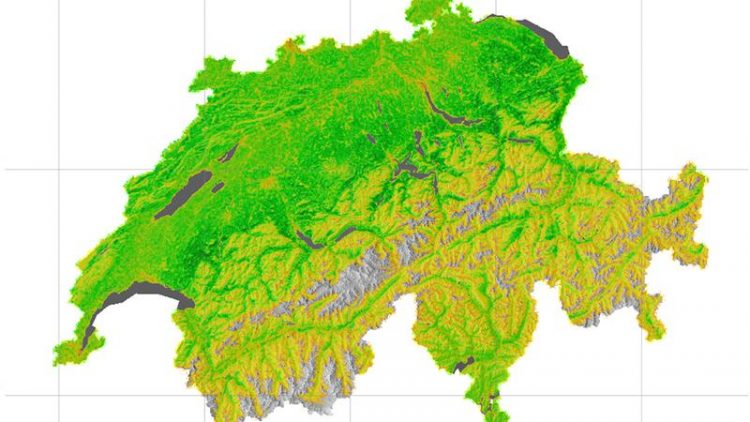Diverse Landscapes Are More Productive and Adapt better to Climate Change

Switzerland from a satellite perspective: The vegetation’s average biomass production (orange: low, green: high) is strongly increased in landscapes with high biodiversity. UZH
The dramatic, worldwide loss of biodiversity is one of today's greatest environmental problems. The loss of species diversity affects important ecosystems on which humans depend.
Previous research predominantly addressed short-term effects of biodiversity in small experimental plots planted with few randomly selected plant species. These studies have shown that species-poor plant assemblages function less well and produce less biomass than species rich systems.
Extensive study with about 2,200 species in 450 landscapes
Researchers participating in the University Research Priority Programme “Global Change and Biodiversity” of the University of Zurich now demonstrate similar positive effects of biodiversity in real-world ecosystems in which mechanisms different from the ones in artificial experimental plots are at play. Using 450 different 1-km2 landscapes that spanned the entire area of Switzerland, they investigated the role of the diversity of plant, bird and butterfly species for the production of biomass, which was estimated from satellite data.
Biodiversity is important for the functioning of complex, natural ecosystems
“Our results show that biodiversity plays an essential role for the functioning of extensive natural landscapes that consist of different ecosystem types such as forests, meadows or urban areas”, study leader Pascal Niklaus from Department of Evolutionary Biology and Environmental Studies says.
The analyses showed that landscapes with a greater biodiversity were more productive and that their productivity showed a lower year-to-year variation.
Biodiversity promoted the adaptation of landscapes
The satellite data analysed by the scientists revealed that the annual growing period increased in length throughout the last 16 years, an effect that can be explained by climate warming. The prolongation in growing season was considerably larger in more biodiverse landscapes.
These relations were robust and remained important even when a range of other drivers such as temperature, rainfall, solar irradiation, topography, of the specific composition of the landscapes were considered.
“This indicates that landscapes with high biodiversity can adapt better and faster to changing environmental conditions,” Niklaus concludes.
Literature:
Jacqueline Oehri, Bernhard Schmid, Gabriela Schaepman-Strub, and Pascal A. Niklaus. Biodiversity promotes primary productivity and growing season lengthening at the landscape scale. PNAS. 4 September 2017. DOI: 10.1073/pnas.1703928114
Contact:
PD Dr. Pascal A. Niklaus
Department of Evolutionary Biology and Environmental Studies
University Research Priority Programme “Global Change and Biodiversity”
University of Zurich
Phone +41 44 635 34 13
E-mail: pascal.niklaus@ieu.uzh.ch
http://www.media.uzh.ch/en/Press-Releases/2017/biodiversity-landscapes.html
Media Contact
All latest news from the category: Life Sciences and Chemistry
Articles and reports from the Life Sciences and chemistry area deal with applied and basic research into modern biology, chemistry and human medicine.
Valuable information can be found on a range of life sciences fields including bacteriology, biochemistry, bionics, bioinformatics, biophysics, biotechnology, genetics, geobotany, human biology, marine biology, microbiology, molecular biology, cellular biology, zoology, bioinorganic chemistry, microchemistry and environmental chemistry.
Newest articles

An Endless Loop: How Some Bacteria Evolve Along With the Seasons
The longest natural metagenome time series ever collected, with microbes, reveals a startling evolutionary pattern on repeat. A Microbial “Groundhog Year” in Lake Mendota Like Bill Murray in the movie…

Witness Groundbreaking Research on Achilles Tendon Recovery
Achilles tendon injuries are common but challenging to monitor during recovery due to the limitations of current imaging techniques. Researchers, led by Associate Professor Zeng Nan from the International Graduate…

Why Prevention Is Better Than Cure—A Novel Approach to Infectious Disease Outbreaks
Researchers have come up with a new way to identify more infectious variants of viruses or bacteria that start spreading in humans – including those causing flu, COVID, whooping cough…



